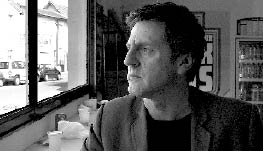Caché
by Girish Shambu

When national film critics published their 2005 Best-Of lists last month, many of them featured the French film Caché (“Hidden”). It’s a pleasure to now see it appear in Buffalo. Caché is like a big and rich piece of cinematic cake for you to sink your teeth into, with one important difference. It has many layers and many flavors, but none of them are sweet. On the surface it’s an extraordinary suspense thriller, but that is only the tip of its iceberg. It is ambitious, being both about intimate matters like family and about large subjects like history or the state of the world today.
The movie begins strikingly with a stationary camera calmly watching a house on a quiet Paris street. Normal cinematic practice would begin with an establishing shot and then cut to a closer, more detailed shot, for example inside a house. But three minutes pass, and we begin to realize that something weird is afoot: this is no normal, functional establishing shot—it looks more like a voyeur’s point of view. Then suddenly, the image “rewinds” and we realize that we are watching some sort of surveillance video.
The video is being watched by a respectable upper middle-class couple: Georges (Daniel Auteuil), a TV literary show host, and Anne (Juliette Binoche), a book editor. Someone, for some unfathomable reason, is sending them tapes which indicate that the family is being watched. Slowly, other things begin arriving at the door, like crude and childish (but creepy) drawings. The psychological pressure mounts in the household, and the family begins to crack.
Michael Haneke, the Austrian director and writer of Caché, has made a thriller that is also a critique of thriller formulas. There are no fast or hand-held camera movements here; instead, the camera observes quietly, motionlessly, almost icily. There is no music soundtrack to cue us into feeling scared or uneasy. There are no odd camera angles to enhance suspense. And there is none of the “exciting” editing to whip us into a pulse-pounding frenzy. Haneke eschews these blatantly manipulative effects. Instead, he makes movies in which it’s less important to entertain than to engage the viewer in some kind of examination of real-world complexity, rather than fleeing it for the refuge of escapism.
In Caché, the videotapes quickly result in the dredging up of repressed memories from Georges’ childhood, when he lied about a young Algerian boy his family was about to adopt, thus having him sent away. The submerged undertones of ethnic tension now break to the surface, and the family is forced to deal with them. But though this is a story of one family, it resonates uncannily with the world at large. It seems to come perilously close to predicting the recent French riots and even packs a potent post-9/11 punch without ever mentioning it.
Haneke might be a moralist but he does not present the world in black-and-white terms. He doesn’t paint characters as heroes or villains, and we never quite know who is telling the truth and who isn’t. In his films, women and especially children are a bit more vulnerable and thus more deserving of his sympathy. The educated middle class family in the movie is fashionably intellectual but morally myopic, afraid of self-examination. But ultimately, the characters all possess psychological complexity. Also, Haneke doesn’t allow us easy identification with any one sympathetic character (which he thinks of as another hallmark of emotional manipulation) at the expense of others. We see them all, identify somewhat with each one, but we don’t find out all we’d like to about them. As in real life, some questions remain unanswered.
I’ve seen Caché twice and I’m amazed at how carefully constructed it is. The details are important, and the movie requires our participation in the making of its meaning. A warning: the movie does contain one brief scene of violence that is over in an instant, but is nevertheless unsettling. And a friendly heads-up: Not a single shot in this film is wasted, so please don’t start rising when the credits appear; stay with it till the end, and you may find a revelation or two tucked away in that last parting shot.
|
Issue Navigation> Issue Index > v5n5: Suing the Governor (2/2/06) > Film Reviews > Caché This Week's Issue • Artvoice Daily • Artvoice TV • Events Calendar • Classifieds |









 Current Issue
Current Issue